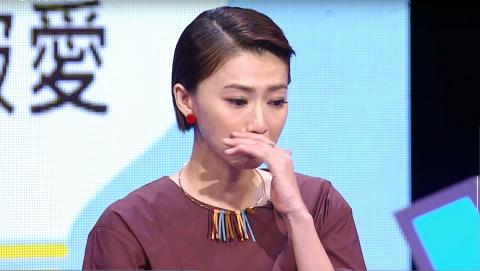Rene Hou, who has appeared in many Taiwanese-language TV dramas, is best known for her role in “Fiery Thunderbolt.” Hou may look tough, but she burst into tears recently while filming an episode of the Public Television Service (PTS) TV show Mr. Brain. She revealed that she suffers from an inherited eye condition, “Retinitis Pigmentosa” (RP), which she got from her father.
RP is a retinal disorder, night blindness being one of the more conspicuous symptoms. “You never know when you will start losing your eyesight,” Hou said on the show, speaking of the pressure she was under. She has been dating actor Louis Hsiao for 15 years, but they are still not married because of her experience looking after her father. “It would be tough for Louis to have to take care of someone with this condition,” she said.
(Liberty Times, translated by Eddy Chang)

Photo courtesy of PTS
照片:公視提供
藝人侯怡君深耕台語電視劇,知名代表作有「台灣霹靂火」等。看似女強人的她,日前參加公視「大腦先生」節目卻淚灑攝影棚,坦言遺傳到父親的眼疾「視網膜色素病變」。
這是眼睛視網膜的病變,而明顯的症狀就是夜盲。「你永遠都不知道什麼時候會看不到」,侯怡君在節目中吐露出她的壓力。她仍未與交往十五年的演員蕭大陸結婚,原來也是因為經歷過照顧父親的處境,她說:「要他照顧這樣的病人是非常辛苦的。」
(自由時報)

The winner of next month’s US presidential election will govern a nation of more than 330 million people, but the contest will almost certainly be decided by just tens of thousands of voters — a tiny fraction of the populace — in a handful of states. That’s because only seven of the 50 states are truly competitive this year, with the rest all comfortably Democratic or Republican, according to public opinion polls. Among those seven battlegrounds, Pennsylvania, the most populous, stands out as the most likely state to determine whether Democrat Kamala Harris or Republican Donald Trump is the next president. The

Imagine the thrill of diving into the ocean, holding your breath, and exploring underwater worlds without any modern gear. This is the life of the haenyeo, South Korea’s sea women. Armed with only diving goggles and handmade tools, these skilled divers venture into the ocean’s depths to manually harvest marine products like abalone and seaweed. The haenyeo tradition, dating back to the 17th century, was originally dominated by men. However, a combination of wars and deep-sea fishing accidents created a shortage of male labor. Women’s greater resistance to cold proved a blessing to the struggling communities. As a result, they began

A: Finally! Cantopop superstar Andy Lau is touring Taipei starting tonight. B: Yeah, he is set to perform at the Taipei Arena for four nights. A: It seems like he is still energetic on stage even at the age of 63. B: Lau, Jacky Cheung, Leon Lai and Arron Kwok are dubbed Hong Kong’s “Four Heavenly Kings.” A: Hopefully, the four “kings” can visit Taiwan more often. A: 終於啊!香港天王劉德華今晚起將在台北開唱。 B: 他預計在台北小巨蛋,一連熱唱4天! A: 看來劉天王雖然63歲了,在舞台上還是一尾活龍。 B: 他和張學友、黎明、郭富城還被稱為香港「四大天王」。 A: 希望天王們以後能更常來台灣。 (By Eddy Chang, Taipei Times/台北時報張聖恩)

Continued from yesterday(延續自昨日) https://www.taipeitimes.com/News/lang Just as people today have smart tips for staying cool, ancient civilizations also had their own methods to beat the heat. Ancient Romans, for example, came up with numerous ingenious ways to cool off. Clever city planning and architecture were used to deal with the high temperatures in ancient Rome. Fountains and parks were thoughtfully placed throughout the city to offer people relief. Furthermore, buildings were constructed with thick stone walls that did an excellent job of stabilizing internal temperatures. Narrow streets, lined with tall walls, also created plenty of shade for pedestrians. The ancient Roman